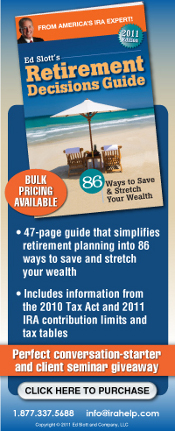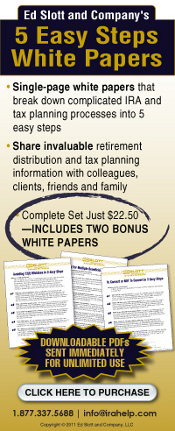 |
In This Update:
- Q of the Month: Does Social Security Count as Earned Income?
- Key Focus: Roth IRAs vs. Roth Company Plans
- Ruling to Remember: Taking a Short-Term Loan From Your IRA is Risky
Resources
Expert
Professional
Assistance
|
??
Question of the Month: Does Social Security Count as Earned Income?
Q: I am 64 years old and am receiving my Social Security check every month. How much, if any, can
I still contribute to my Roth IRA? For 2010?
A: Social Security does not count as earned income. In order to contribute to a Roth IRA, you must have earned income equal to or exceeding the contribution amount. Compensation would include: wages, salaries, commissions, professional fees, bonuses, and the like. If you are filing a joint return, the phase out limits for contributions to Roth IRAs begin at $169,000 and completely phase out at $179,000. For single filers, it is $107,000 - $122,000. In any case, it is too late to make a contribution for 2010. The last day to do that was April 18, 2011, even if your return is on extension.
JOIN US AT THE BILTMORE!
GET EDUCATED. GET AHEAD.

GROUP DISCOUNTS AVAILABLE! CONTACT US AT 877-337-5688 FOR MORE INFORMATION
Court Ruling: The 401(k) Beneficiary Form Trumped!
|

401(k) Beneficiary Form is Trumped by Remarriage; Disinheriting Children
- The Plan Beneficiary Form was Trumped
- Facts of the Case
- The Arguments
- From Section 6.13 of the Cajun Industries, LLC 401(k) Plan
- The Court's Decision
- Preventing Clients from Making Plan Beneficiary Mistakes
- Schwab v. Chandler January 20, 2010
- Spousal Rights under ERISA do NOT Apply to IRAs
- Update Beneficiary Forms
- Proactively Monitor and Plan for Changes in Clients' Lives
- Advisor Action Plan
Guest IRA Expert
Christian Cordoba
CFS, RFC
California Retirement Advisors
El Segundo/Manhattan Beach, CA
What Advisors Need to Know About IRAs Payable to Trusts
If you are not already an Ed Slott's
IRA Advisor Newsletter subscriber, you can preview
past issues before subscribing.
|
|
 June Key Focus
June Key Focus Roth IRAs vs. Roth Company Plans
When most people think about Roth accounts, they think about
the rules relating to Roth IRAs. There are some key
differences, though, between Roth IRAs and the Roth accounts
through a 401(k), 403(b), or 457(b) plan.
Difference #1: Access to Your Funds
Regardless of the type of plan account (i.e. regular 401(k),
Roth 401(k)) you may have, when money is held within an
employer plan, access to the funds is often limited.
Sometimes, the limitation is due to the Tax Code and IRS
Regulations that apply universally to all plans, but quite often,
a plan's own rules can place further limitations on when you
can access your own funds.
Roth IRAs, on the other hand, have no such legal restrictions.
While a Roth IRA investment may place some restrictions on
you (i.e. a penalty for withdrawing your money before a
certain date), the Roth IRA rules allow for Roth IRA money to
be accessed at any time. This is a big benefit, particularly if
you are young. Remember, regardless of how old you are or
how long you've had a Roth IRA, Roth IRA contributions may
be distributed at any time tax and penalty free.
Difference #2: Required Minimum Distributions (RMDs)
A Roth 401(k) or any other designated Roth account is subject
to plan rules. As such, at age 70 1/2 you must begin taking
distributions from those accounts, just as you would from
traditional 401(k) accounts. If you are over age 70 1/2, still
working and own less than 5% of the company you are
working for, then you may be able to delay RMDs from the
plan of the company you are working for until the year you
retire. If you plan to use your Roth 401(k) money to
supplement your retirement income, the RMDs may not seem
like that big of a deal, but if your goal is to leave the account
alone to maximize its value down the road, the RMDs will
significantly hinder that effort.
Roth IRAs have no RMDs during the Roth IRA owner's
lifetime. You can leave the account alone to continue to grow
tax free for as long as you would like. The extra growth can
help provide greater tax-free distributions later in life or can be
used to provide a tax-free legacy for future generations. Keep
in mind, however, that beneficiaries of Roth IRAs are subject
to RMDs, but those distributions are generally tax free.
|
|
 Ruling to Remember Ruling to Remember Private Letter Ruling 201118025
A taxpayer we will call "Jerry" received a distribution from his IRA, using
it as part of a plan to allow his ailing mother to move residences with the
intention of rolling it back into his IRA within the allowable 60-day
period. After pulling together funds which included "Jerry's" IRA
distribution, the mother would purchase a new residence in cash, enter into
reverse-mortgage financing and receive a lump-sum cash payment which
she would use to repay "Jerry" and the rest of his siblings.
So, "Jerry" received the distribution, and seven days later, it was applied
to the purchase of his mother's new residence. On that same date, the bank
began processing the reverse mortgage. "Jerry" asserted that the bank
promised him the entire process would be completed within a time frame
which would have allowed him to meet the 60-day period for rolling the
money back in this IRA. However, numerous delays resulted in this process
taking longer than the prescribed time frame. "Jerry" did eventually
redeposit the money back into this IRA, but not until after the 60-day
period. He blamed the bank and filed a Private Letter Ruling.
The IRS disagreed.
It asserted that "Jerry" made a short-term loan when he withdrew money
from his IRA, and while he intended on redepositing the funds into his IRA
prior the expiration of the 60-day rollover period, he assumed the risk if the
process took longer than expected (which it did). His request was denied.
LESSON TO LEARN:
No matter what the reason is, if you use your IRA distribution as a shortterm,
interest-free loan and cannot pay it back within the 60-day rollover
period, IRS will NOT grant an extension of time for you to complete the
rollover. You will end up with a taxable distribution.

|
|
|

100 Merrick Road Suite 200E Rockville Centre New York 11570
800.663.1340 toll-free 516.536.8282 telephone 516.536.8852 facsmile [email protected] email
© 2011 Ed Slott and Company, LLC
|
|
|







 June Key Focus
June Key Focus Ruling to Remember
Ruling to Remember